The Imperial Phase arc has come to an end through what could best be described as an impulsive bout of artful bloodlust. Though Sakhmet’s unpredictability is sure to become some degree of nightmare fuel, it’s relatively mild in comparison to this special one shot, the second in WicDiv‘s span. Now, before getting into an analysis proper, do I think this special is as good as 1831? The answer varies according to persona taste, but 1831 is a tough act to follow in any case. However, this special does exhibit great quality on its own, and it actually sheds some light on some of the mysteries behind the Recurrences, namely the actual mortality of the Gods.
The unveiling alone is quite catching, but there is even more to say of this special in terms of aesthetics, temporal placement, and symbolism. In fact, Jamie McKelvie’s cover hints plenty on its own. 455 AD being the date of the second Sack of Rome during the Empire’s decay, one can expect some degree of unease and destruction in the air. So the flames in the background are basically a must. Yet the Gods’ presence in this period are represented by the effigy of a new Emperor; the bloodied hands suggest a relation of deed and consequence.
But it is the sign painted on the statue that intrigues the most. The bloody Chi-Rho Christogram essentially marks this moment as the fall of the Pantheon as Gods in the eyes of the Western paradigm. With the looming hegemony of the Christian Church, the quality of paganism becomes vilified. It’s simply no country for old Gods. Without further ado, let’s get into it, as Portuguese artist André Lima Araújo graces this special with his pencils.
455 ADD
“Let me burn”
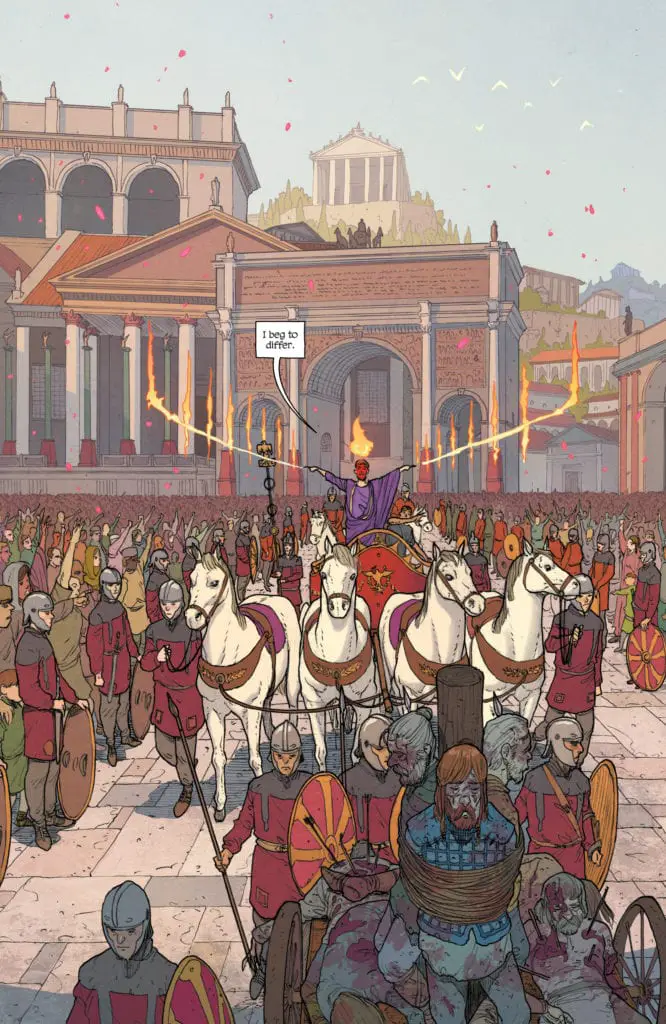
The Gods’ circle is a rather bleak picture. It’s all skulls of an archaic-looking design, which puts us in the late stages of the Recurrence. Only one effigy remains ‘alive’, and it’s an inverted Chi-Rho, thus making the ‘Anti-Christ’ the sole remainder of this Recurrence. It’s a Lucifer story, which is always nice. However, as we’ll learn in a bit, there is far more to Lucifer than the traditional character tropes.
Despite the ongoing Vandal invasion, we start with a pretty mundane and peaceful scene: a youth gutting a goat, as you do. Yet amidst his task, a strange man walks by. It is Lucifer, who has chosen to dress as the long deceased Julius Caesar—quite a sight for the time. But it is no mere affectation, in spite of all plausible claims to the contrary. He’s literally walking about Rome, trying to find the Vandal army, just so he can beat them and become Emperor. The greatest of ambitions live through simplicity, my long deceased Czech barber used to say.
Naturally, Lucifer does as he intended with the Vandals, spooking the lad and his poor sheep. Fast forward to the happy aftermath and Lucifer’s triumphant crowning. While a peasant does the honor of placing the laurel wreath on Lucifer’s head, he whispers a message of humility for the new ruler. But Lucifer’s way of saying “fuck that” is setting the wreath ablaze, thus granting himself a glorious flaming crown. Along with the red Jupiterian ceremonial paint on his face, we learn soon just what kind of character we have in our hands. Honestly, though, can anyone conceive a humble Lucifer? Not even melancholy, dull, post-modern White Duke-esque Lucifer was humble.
The mood mellows out a bit once the proper Imperial Phase begins. Lucifer appears contemplative as he reminisces on times past. It turns out that this God used to be an actor before his newest career choice. It’s quite a leap up the world considering actors weren’t seen in too great a light in the Empire. Still, Lucifer looked happy, as did his lover, the God of Wine. Interestingly there is a continuous alternation of the latter’s name, switching between the Greek Dionysus and the Roman Bacchus. In another flashback, this is revealed to be a choice in terms of fashion; fair enough. Alas, Lucifer’s yearning and his wish that Dio/Bac heeded him over ‘her’ are a constant. And we fully know who that particular ‘her’ is.
Enter Ananke, who reprimands Lucifer for his deeds. She says nothing of him becoming Emperor, mind you. Rather she speaks of his desire to live on and not die as the rest of his divine fraternity. We’ve heard a discourse of this kind before, but it’s no longer that easy to dismiss her as a preacher of bullshit than before. Now we know that his actions actually could and would most likely compromise the future (i.e. The Great Darkness). Ananke urges him to die for the sake of Rome. But his stance is quite clear on the matter. He’ll raise the social status of actors, as a tribute to his previous craft. But he also wants to see the Empire through to a new zenith. In his view, he will do much more for Rome and Julius than a Lucifer.
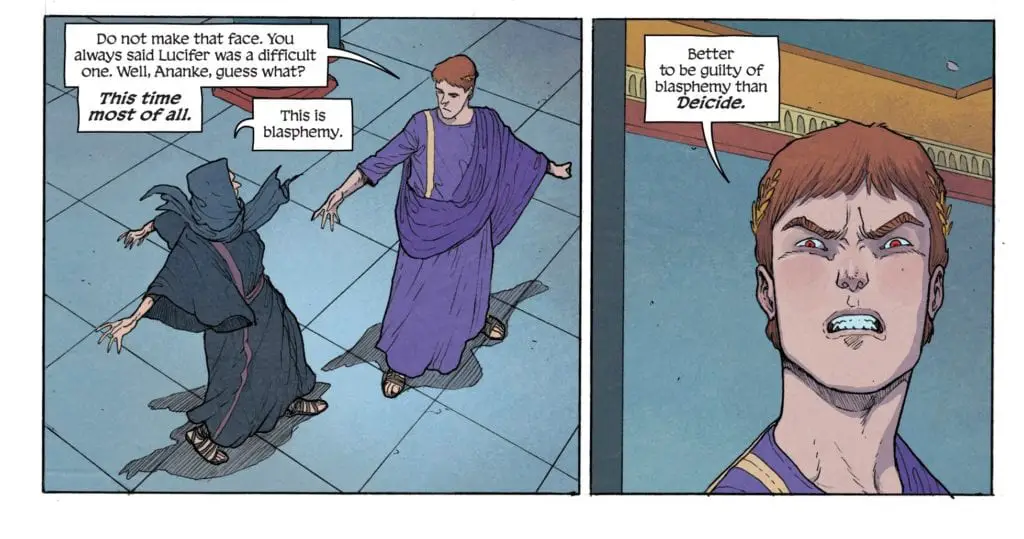
Furthermore, renouncing the name and persona of Lucifer means renouncing this status as a Christian entity. This will be massively relevant later on…
His defiance continues as he recollects the demises of his peers, and Ananke’s efforts to restrain the Gods’ actions. One example in particular is the marriage between this age’s Inanna and Attila the Hun. In this diegetic universe, it was their wedding night that killed Attila, thus making for a charming vandalizing of history. I’m quite okay with it, it’s fun, but I digress.
As an ultimate dismissal, Lucifer snaps his fingers to set Ananke on fire and then downright beats her up. He doesn’t kill her, though, which creates space for a parley. Ananke says that his godhood will consume him and proposes a deal. If he’s still alive past his ‘death line’, Lucifer is free to kill her. But if not, she will be the one to bury him as per the pagan way.
Lucifer doesn’t comply nor does he turn down this deal. Still, Ananke’s words seem to have reached his mind.
Later that day, Julius’ takes on the other half of his duties. He put on a lovely show for the common folk, but he’s also perfectly willing to execute his function as the statesman. He truly means to restore order, Pax Romana, and to centralize power back in Rome proper. Goals this serious will require serious powers, which the Senate acknowledges as necessary in lieu of no legion. One subject leads to another, and suddenly an obvious red flag pops up. Lucifer gets his times mixed up by a margin of centuries, hinting to the Senate that something might be wrong with his emotional and/or psychological state. Lucifer is quick to try and reassure them he is no Caligula, but having to do that is always bad news.
Two weeks later, and… well, that escalated quickly.
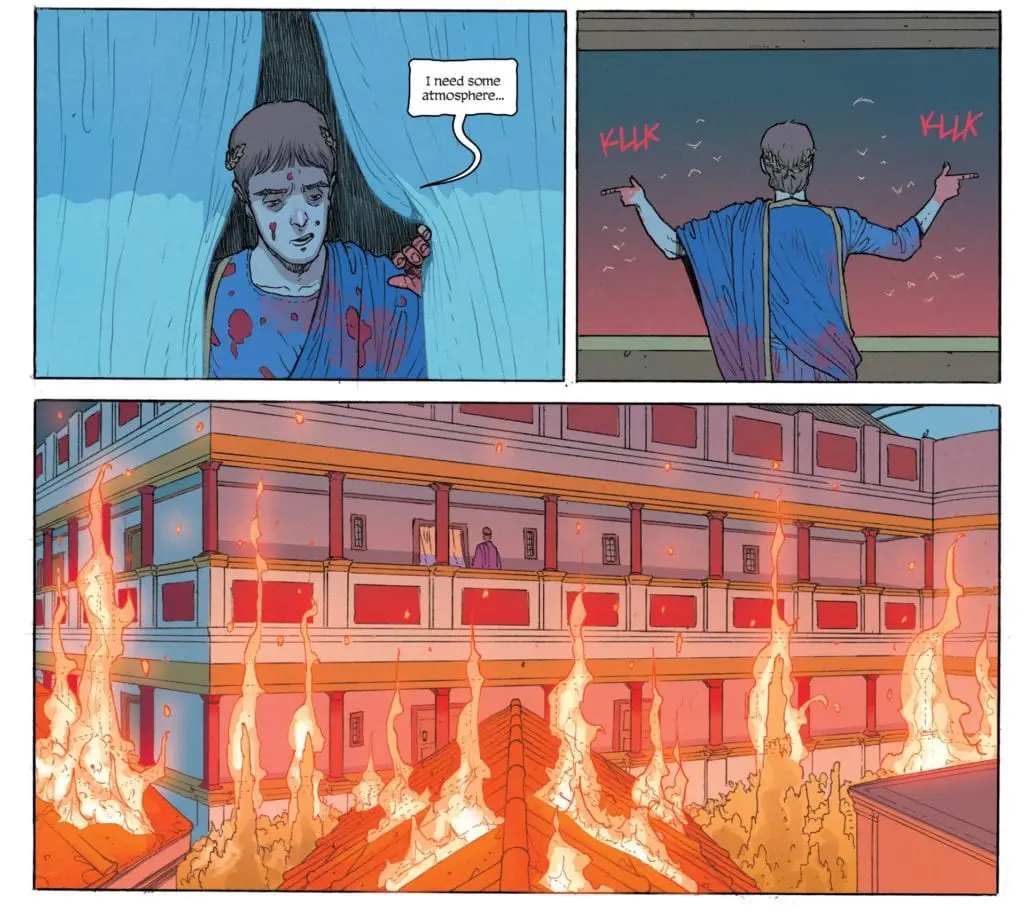
Lucifer’s will to be a good Emperor wasn’t enough. Both his divine hubris and lots of wine have resulted in an ominous mix. He has effectively become the other awful Emperor: Nero fiddling as Rome burns, alas with a nightmarish twist. Lucifer has turned the bodies of the Senate, assassins, and servants into musical instruments, which he admits sound poorly. He goes on to reflect how Rome’s pragmatism denies arts and beauty. It’s the classic philosophical dichotomy of rationality and art, Apollo and Dionysus. The latter presents himself as a vision taunting him on his excesses and his responsibility.
The addled episode leads him to take desperare measures. He needs help. So he goes and makes the infamous hole in the Temple of Jupiter as he calls this Father-God. And in a very Passion of the Christ-like manner, he requests to be allowed to live, for Rome to live. He adds some gravitas by dousing himself in a self-made Roman pyre, alluding to Julian the Apostate, the last Pagan Roman Emperor. However, his sacrifice dies down pathetically as his powers begin to fade. No matter how much he snaps his fingers, no fire comes out and so, he is denied his death as he willed it. In a grotesque inversion of the ceremonial red paint from his ascension as Emperor, his face now is painted red as well, from his own blood and despair.
In his attempts to summon his powers, he ends up burning his own eyes out. His final words are a callback to yet another Emperor, the Shakespearian one. Et tu, Jupiter? (Feel free to chuckle from this tragic irony, I did.) Thus, we learn the fate that awaits the Gods at the end of their lifespan; their powers are snuffed out as divinity leaves them and so are their lives.
But their death does not necessarily occur because of some ancient decree dictating it, rather because divinity will cause the Gods (humans) to decay and do horrendous things. They die by their own doing, but they die less than base humans. This is what awaits our beloved Pantheon, now jeopardized because Persephone murdered Ananke, the one who gifts death before madness. Ain’t that lovely?
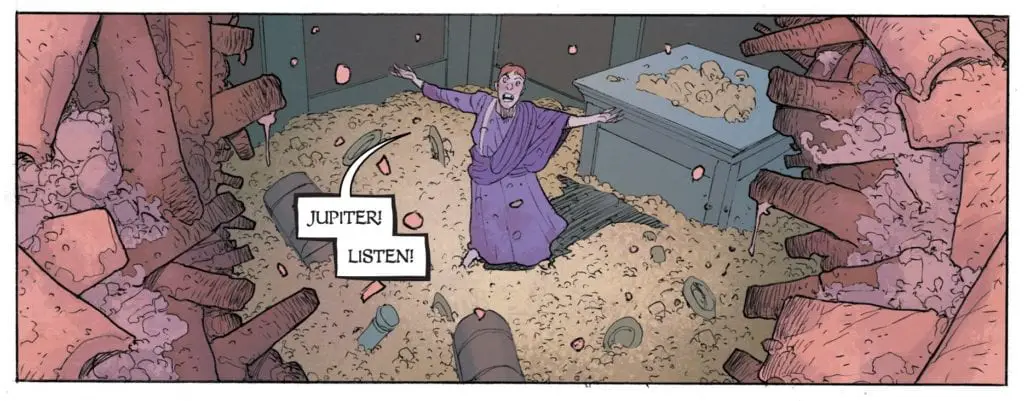
After Lucifer’s death, Ananke drags his body out of the city and into the bed of the Tiber. She won’t give him the funeral he would have desired, but she won’t give him a Christian one to deny his status either. Her pagan funeral rite is a shit one: cutting his body into pieces and dumping them into the river’s flow. A fate shared by other shit Romans for wankers (credits to Ben Potter for a possibly timeless expression). As she carries this out, Genseric, King of the Vandals walks up to her. They talk of the Gods, of the high stakes behind their works and deeds, and of their very status as deities, much to Genseric’s own doubts.
She convinces him to claim Rome, which will eventually fully become “The City of God,” thus burying this event for good with the Sack of Rome proper. Again, it’s a beautiful vandalizing of history but also a turning point for the perception of non-Christian deities. The brief reign of the “flaming Caesar” would practically be the Pantheon’s zenith before Jesus takes the wheel.
As for Lucifer, however, Ananke declares that the world must never know that a God was Emperor, as that would unearth the fact that he attempted to outlive his divinity. Otherwise, future recurrences may want to try doing the same he did, live long enough to decay and do unspeakable things. Let this particularly red flavour of Rome’s Christianization stick with us for a moment as we recall on the events of our Recurrence. And the rest is history, bloody, brutal history…
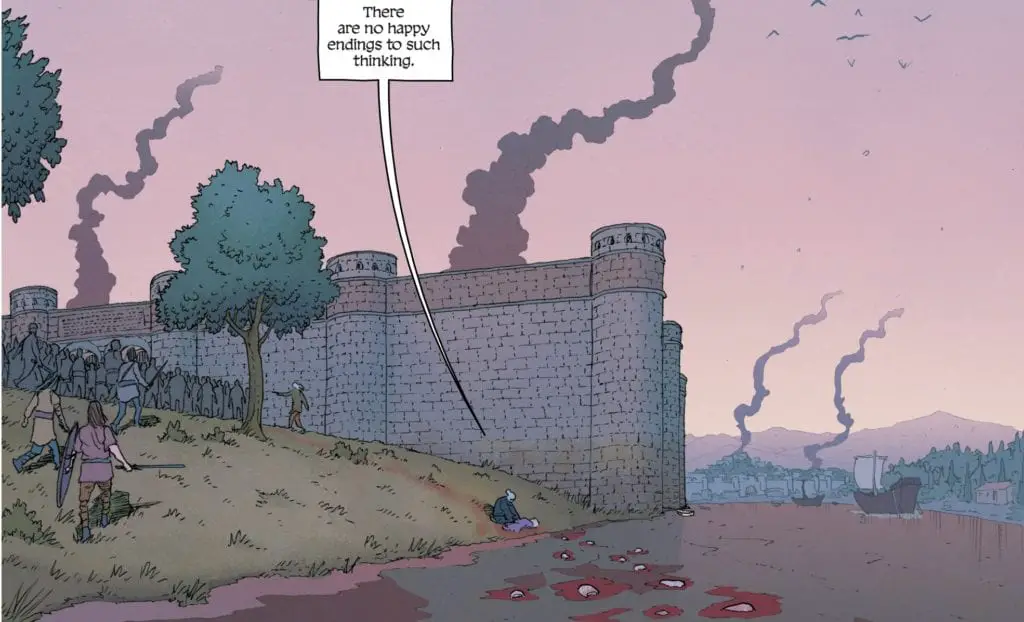
All images are courtesy of Image Comics
The Wicked + The Divine 455 AD Credits
Writer: Kieron Gillen
Art / Cover: André Lima Araújo, Jamie McKelvie, Matt Wilson

